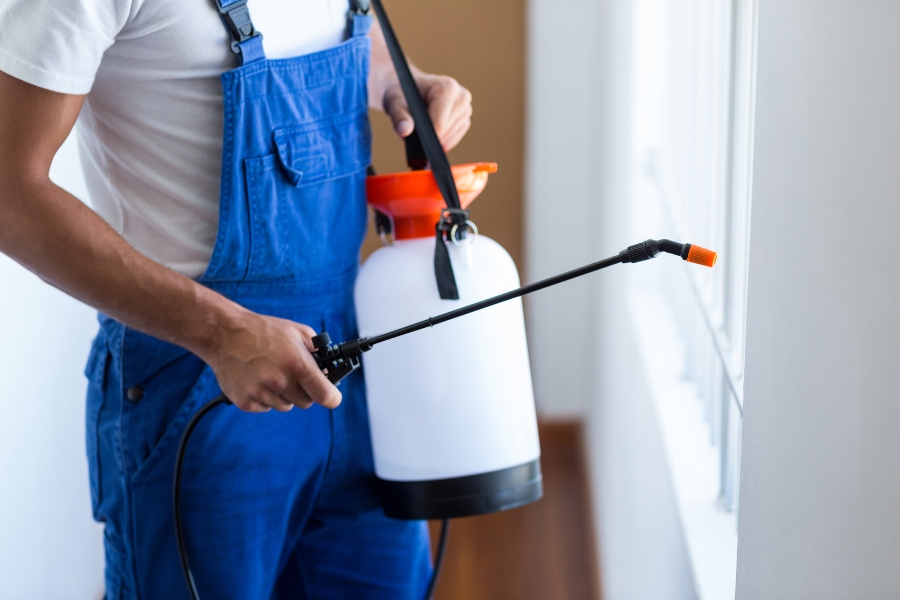Comprehensive Pest Control Clovis Solutions for Every Demand
Wiki Article
Comprehending the Different Techniques to Insect Control: A Comprehensive Guide

All-natural Pest Control Methods
Using environment-friendly techniques such as buddy growing and biological pest control is essential for properly managing bugs in agricultural settings. Friend growing includes expanding various plants in closeness to hinder pests, enhance nutrient uptake, and enhance overall plant health. For instance, planting marigolds together with tomatoes can help repel nematodes. Similarly, intercropping maize with vegetables can interfere with the breeding patterns of parasites like corn borers.Organic pest control includes introducing all-natural killers or microorganisms to regulate pest populations. Ladybugs, for example, prey on aphids, controlling their numbers without the need for chemical pesticides. An additional instance is using Bacillus thuringiensis (Bt), a bacterium that targets particular insect bugs while being safe to people, pets, and advantageous pests.
These eco-friendly methods not just lower the dependence on synthetic chemicals yet also aid protect biodiversity and soil health and wellness. By including natural parasite control methods right into agricultural techniques, farmers can accomplish lasting pest management while minimizing adverse influences on the environment.

Chemical Insect Control Solutions
Along with natural pest control techniques, the application of chemical insect control options plays a substantial role in effectively managing pest populations in agricultural environments. Chemical bug control options are created to target details bugs that may create substantial damages to plants. These services commonly consist of synthetic chemicals that are made to eradicate pests promptly and effectively.One of the essential advantages of chemical parasite control services is their efficiency in regulating parasite infestations on a big scale. Farmers can apply these options utilizing numerous methods such as spraying, airing out, or seed treatment to protect their plants from harmful bugs, weeds, and diseases. Furthermore, chemical pest control services are fairly very easy to use and can give fast outcomes, assisting farmers safeguard their returns and lessen economic losses.
Nevertheless, it is necessary to make use of chemical parasite control options carefully to decrease potential adverse effects on the environment, non-target organisms, and human health and wellness. Proper application view website strategies, adherence to security guidelines, and normal monitoring are vital to ensure the responsible use chemical bug control options in farming methods.
Organic Pest Control Approaches
Organic pest control comes close to utilize all-natural predators or pathogens to take care of parasite more populations in farming setups successfully. One usual organic control technique is the introduction of all-natural opponents, such as ladybugs or parasitical wasps, to target specific bugs.An additional organic control approach entails utilizing microorganisms like bacteria, viruses, or fungis to infect and kill bugs. On the whole, biological insect control techniques use a lasting and targeted service to pest administration in farming.
Integrated Bug Administration (IPM)
Integrated Insect Administration (IPM) is a comprehensive technique that integrates various pest control methods to properly handle and lessen pest populaces in farming systems. IPM concentrates on lasting avoidance of parasites through a mix of organic, social, physical, and chemical control methods. By incorporating these different methods, IPM aims to minimize dependence on chemical pesticides, decrease environmental influence, and promote lasting parasite administration practices.
One trick aspect of IPM is using organic controls such as natural predators, bloodsuckers, and pathogens to control insect populaces. This approach uses the power of nature to maintain a balance between insects and their natural adversaries without creating harm to the atmosphere.
Furthermore, IPM involves cultural practices like plant cleanliness, turning, and environment adjustment to create negative conditions for pests and interrupt their life cycles. Physical controls such as barriers, mulches, and catches are likewise utilized to protect against parasite problems.
Mechanical and Physical Bug Control Strategies
Making use of non-chemical approaches, such as mechanical and physical pest control methods, is an essential element of comprehensive bug monitoring approaches, building upon the structure of Integrated Insect Administration's holistic approach. Mechanical parasite control includes using physical obstacles or traps to stop pests from accessing and damaging crops or frameworks. This technique can consist of methods like mounting screens on windows, utilizing row covers in agriculture, or employing sticky catches to catch pests.Physical parasite control methods, on the various other hand, concentrate on directly removing parasites go now with physical methods. As an example, using warm treatments to eliminate bed pests or vacuuming up pests like spiders or ants can be effective methods to take care of infestations without using chemicals. By incorporating these mechanical and physical insect control techniques right into an Integrated Insect Monitoring plan, experts and individuals can decrease dependence on pesticides while still successfully handling pest populaces and reducing damage.
Conclusion

In addition to all-natural parasite control techniques, the utilization of chemical bug control options plays a considerable role in properly handling pest populations in farming settings.One of the key advantages of chemical bug control remedies is their efficiency in controlling pest invasions on a large scale.Integrated Pest Administration (IPM) is a thorough technique that integrates different insect control approaches to successfully take care of and reduce pest populations in agricultural systems.Using non-chemical approaches, such as physical and mechanical parasite control strategies, is a vital element of comprehensive insect administration techniques, constructing upon the structure of Integrated Pest Monitoring's holistic approach. By including these mechanical and physical bug control strategies right into an Integrated Insect Administration plan, specialists and individuals can decrease dependence on pesticides while still effectively managing pest populations and lessening damages.
Report this wiki page